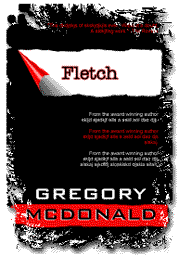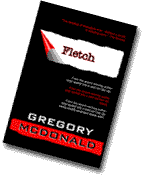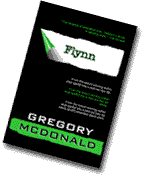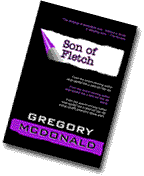 "Evokes
half the names of crime fiction...that
easy writing and preponderance of
everyday dialogue gives us Agatha Christie...the highly ingenuous,
physically tricky (plot) strictly "Evokes
half the names of crime fiction...that
easy writing and preponderance of
everyday dialogue gives us Agatha Christie...the highly ingenuous,
physically tricky (plot) strictly
fair-played adds Dorothy Sayers... observation plus social
comment worthy of the great Hammet."
-Times (London) One measure of an artist's
genius is the
degree to which he advances the
technique of his craft. Gregory Mcdonald's
way of telling a story, frequently depending
almost entirely upon dialogue for characterization,
drama, wit, even action at first was declared "impossible"
by editors. His style has been among the most widely imitated
since he first demonstrated it, although never very successfully.
The prime example of this
style is not in a mystery, but in "Lovers and Pantaloons,"
the first work in his volume on The Seven Ages of Man, "Exits
and Entrances." (See Other
Works.)
Frequent Quotes from Gregory
Mcdonald
"The magic I attempt
is to point the finger, as concisely as possible set the scene,
then pull back my hand, disappear as the author, leave the
reader alone with the characters. Of course the result of
this is, not typical of authors, that tens of millions more
people know the names of my characters than know my name,
which I don't mind a bit."
"I want the reader to
hear with his eyes."
"Writing mysteries lets
me get away with murder. I think 'the mystery' may be the
greatest form for social criticism, simply because it is pedestrian."
The Mysteries
There are nine "Fletch"
novels, three* "Flynn" novels, two** "Son of
Fletch" novels, two "Skylar" novels; seventeen
mystery novels in total.
*Ed.'s note: Rumor has it that there is a fourth "Flynn"
novel in existence that, for some reason, Mcdonald is not
releasing.
**Ed.'s note: Asked by academic critics if it is possible
that from Mcdonald's Celtic heritage the "Fletch"
novels could be related to the traditional "Jack Stories",
Mcdonald originally entitled the "Son of Fletch"
novels "Jack's Story" and "Jack and the Perfect
Mirror." The publisher threatened to renege on contracts
if Mcdonald did not agree to use the iconical name "Fletch"
in the titles.
The
Fletch Novels
(Listed in the order in which
they were written. In the introduction to the three volume
Fletch anthology, "The Fletch Chronicles," (Hill
& Co.,1987-88) Mcdonald discusses the question of in what
order the "Fletch" novels are best read, if any,
plus other questions regarding "Fletch."
Fletch,
1974
Edgar Allan Poe Award, Mystery Writers of America, 1975.
Inference: Drugs
would not be available, i.e., there would be no "drug
problem" without the collusion of some police.
return to top of page
Confess,
Fletch, 1976
Edgar Allan Poe Award, 1977. (The only
time a novel and its sequel won back-to-back Edgars.) In which
Insp. Flynn is introduced.
Inference: The
art market, maintained by the elite, is not better than it
should be.
return to top of page
Fletch's
Fortune, 1978
Inference:
Journalism may feed upon itself.
return to top of page
Fletch
and the Widow Bradley, 1981
Inference:
Mankind's
soul and physical appearance may not agree.
return to top of page
Fletch's
Moxie, 1982
Inference: Actors
are only one with oneself while one is being someone else.
return to top of page
Fletch
and the Man Who, 1983
Inference: Democracy
cannot work if the press exploits too deeply politicians'
private lives.
return to top of page
Carioca
Fletch, 1984
"The best novel written about Latin
America by someone not Latin American."
- Robert
Morales.
As close as Mcdonald has come to a ghost
story.
Inference: Mankind
may perceive human dimensions beyond the obvious.
return to top of page
Fletch
Won, 1985
Inference: Comparing
a law practice with an escort service can be beneficial.
return to top of page
Fletch
Too, 1986
In which something of Fletch's parentage
and moral system is finally revealed. Considered by some to
be a great "father search" novel, school editions
of this book have been published.
Inference:
Despite
not being able to choose one's parentage, nevertheless one
must make moral choices.
return to top of page
Overall inferences
from the Fletch novels: Using intelligence and wit over violence
is more fun. A victim do not be.
The
Flynn Novels
Flynn,
1977
Many mystery purists, including many elder
mystery writers, all ready upset at Mcdonald's publishing
his mysteries as paperback originals ("I like to be read
by people."), his inclusion of wit and sex in his novels,
although grateful to him for helping revive the mystery novel
in America, were enraged by "The Hand" in this novel.
Inference:
Perception can
beat procedure.
return to top of page
The Buck
Passes Flynn, 1981
Inference: The
biggest thief in history is inflation.
return to top of page
Flynn's
In, 1984
Mcdonald has mentioned being intimated by some critics declaring
this book a classic instantly upon publication.
Inference: However
concealed, every society has an "old boys' network",
which works in unpredictable ways.
return to top of page
Flynn's
World, 2003
return to top of page
The
Son of Fletch Novels
Son of
Fletch, 1993
(preferred title: "Jack's Story")
An informed report on the fascist, neo-nazi,
racist movement.
Inference:
Nihilism always self-destructs.
return to top of page
Fletch
Reflected, 1994
(preferred title: "Jack and the Perfect Mirror")
Written during the collapse of (Communist)
USSR, this has proven to be a highly prophetic novel.
Inference: When
dictatorial authority collapses, mutual and self-destruction
is likely among its previous subjects.
return to top of page
The
Skylar Novels
Skylar,
1995
return to top of page
Skylar
in Yankeeland, 1997
Mcdonald has reported that he designed these works simultaneously
to express something of the differences in value systems and
language between North and South.
Inference: Cultural
differences exist geographically in the United States as they
do in Europe, Asia, Africa.
return to top of page
General Comment
As Mcdonald's "mysteries"
are characterized by strong plots, each with a subplot, strong
characters, wit, and different underlying themes, as indicated
above, over the decades many booksellers have placed his books
on shelves marked "Mysteries", "Humor",
"Mainstream", sometimes all three simultaneously.
return to top of page
|
